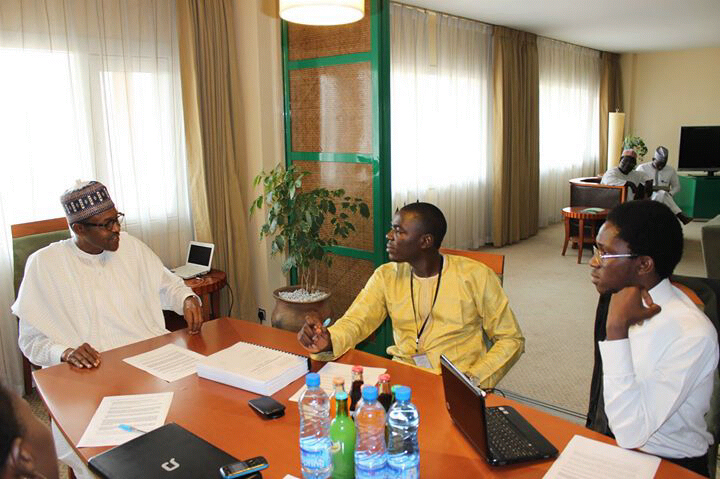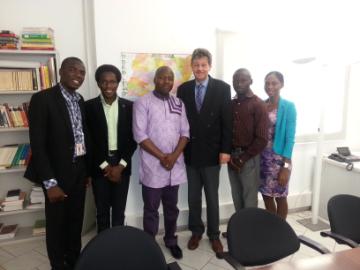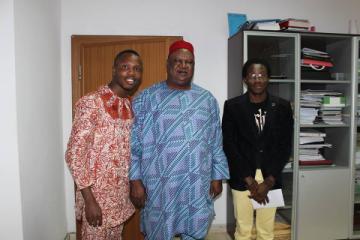Dotun Roy
Come this October which is the month of our independence celebration as a sovereign nation and 2014 being the year of Nigeria’s centenary celebration as a country. Three thoroughbred and patriotic Nigerians are set to make history. These guys have deemed it fit to raise the bar and they are equally already to prove to all Nigerians, African Continent and the world at large that the role of history in the socio-economic development of any nation cannot be overemphasised. In a bid to prove this, they had successfully put all their resources, energies, time and brain together to author the first book ever on “The Metamorphoses of Nigeria (1914 – 2014)”. The book which is divided into three section, with 1000 pages and 600,000 words count will be launched for this generation and posterity to able read and see the great works and dedication of our past and present Nigerian heros and also for Nigeria as a nation to be able to learn from its past mistakes.
In a chat with Chambers Umezulike, Co-author of this great book, who is a Master student of History and International Relations, University of Nairobi Kenya, he said, “Through the production of this book, we intend to strike a recoiled vibe not only in our academic institutions but in the hearts of all Nigerians. We believe this masterpiece will not only be placed in the hands of every Nigerian, both young and old, learned and unlearned, but will in no doubt, extend far beyond her borders and around the globe.”
He also shared with me some of the limitation and hurdles encountered while compiling book. How they went to bed emptied stomach because they had busied all day moving from one city to other so as to meet up with appointments, particularly with top dignitaries and elder statesmen and in the process forgot they had to eat. He shared how they expended their last penny in their wallet to settle hotel and transportation bills. Nevertheless, the end has eventually justified the means.
 Team with Former President General Buhari
Team with Former President General Buhari
 The Team with Nigerian Elderstate men during the research
The Team with Nigerian Elderstate men during the research
The book which is one of the most well researched book that has ever been written by Nigerian and produced in Nigeria was foreword by: Professor Olayemi Akinwumi, President of Historical Society of Nigeria. The Introduction was equally put together by Senator Victor Ndoma-Egba, CON, Senate Leader of the Nigerian Senate.
The Metamorphoses of Nigeria (1914 – 2014) is a compendium that chronicles stages of economic, political and social developments of Nigeria since 1914. It is a timely compendium which carefully reviews and delves into the different stages that Nigeria has passed through as a nation from amalgamation with uncommon dexterity. It brings to the fore, the circumstances that necessitated the unification of the northern and southern protectorates. This book which is all-encompassing highlights every aspect and terrain of the nationhood of Nigeria from amalgamation to date among other notable things. Issues discussed in the book were intended to provoke thought going by the way and manner factors were robustly x-rayed.
BOOK STRUCTURE/SYNOPSIS:
In order to ensure a holistic presentation of what transpired within the period under review succinctly, this book has been segmented into three sections in the overall good of the majority of the people in the society. Section I of the book critically reviews the historic developments (political, social, economic etc.) of the country in the last one hundred years, touching all sectors of the economy and administrations under several topics. It is further sectionalized into:
Before Amalgamation (1807 – 1914): Early History of Nigeria, Early States (Kingdoms and Empires of Nigeria) before 1500, King Jaja of Opobo, Abolition of Slave Trade, Influence of the Christian Missions, Royal Niger Company, The Niger Coast Protectorate, The Northern Nigeria Protectorate, The Southern Protectorate of Nigeria, Colony and Protectorate Of Nigeria, Lord Lugard and Indirect Rule etc.
The Amalgamation (1914): Amalgamation of Nigeria (1912 – 1914), and The Name Nigeria.
Developments after Amalgamation (1914 – 1960): Development In colonial policy, Aba Women Riot, Abeokuta Women’s Riot, Emergence of Nigerian nationalism, Fight for Self Government, The Political Terrain in the 1950s, University of Ibadan, The Nigerian Tribune, Nigeria gets first Prime Minister etc.
- First Republic (1960 – 1966): The First Republic: 1960 – 63/66, Who is Festus Okotie-Eboh?, The Northernization Policy, Constitution of Nigeria, Nigerian National Honours, Electoral Body and Elections in Nigeria, Establishment of the National University Commission etc.
Military Take Over (1966 – 1967): First Coup (1966), The Aftermath of the Coup, Who was Ironsi?, The Death of Ironsi, Gowon’s Broadcast to the Nation after his Swearing-In etc.
Civil War (1967 – 1970): The Igbos flee the North, Gowon and Ojukwu Peace Talks at Aburi, Biafra Secession, Civil War, The Republic of Biafra etc.
Nigeria (1970 – 1979): National Reconciliation after the Civil War, How Ships Came In (The Cement Armada), NYSC, Naira, Nine Point Plan, Murtala Muhammad’s Regime, Olusegun Obasanjo’s Military Regime, The Irikefe Panels, The Aguda Panel, Abuja is born as FCT, Festac 77, Fela etc.
Second Republic (1979 – 1983): New Political Parties and The 1979 elections, The Green Revolution Program etc.
The Military strikes again (1983 – 1999): Muhammadu Buhari’s Military Regime, June 12 Annulment, Interim Government of Ernest Shonekan, Kenule Saro-Wiwa, The General, Commanding Elections, Abdulsalami Abubakar’s Government, Death of M.K.O. Abiola etc.
The Fourth Republic (1999 till date): Olusegun Obasanjo’s Administration, Conflicts in the Niger Delta, The Creation of the Niger Delta Development Commission, Umaru Musa Yar’Adua Administration, Goodluck Jonathan’s Administration, Fuel Subsidy Crises in Nigeria, Boko Haram insurgency in Nigeria etc.
Other Areas of our National Polity: Economic History of Nigeria; Nigerian Aviation, Airports and Federal Airports Authority of Nigeria; Music Industry of Nigeria; Nigeria And Religious Background; Corruption in Nigeria and Fight Against Corruption (EFCC and ICPC); Nigerian Literature; Nigerian Foreign Policy; Women’s role in socio-political development of Nigeria; Nigerian First Ladies and Their pet projects; Nigeria’s Education Sector; Transportation System in Nigeria; Political Structure in Nigeria; The Nigerian Legal System; Industrial Unions in Nigeria; Nigeria and Unemployment Issue; Nigeria’s Human Rights; Nigeria Cedes Bakassi Peninsula to Cameroon; Kidnapping in Nigeria etc.
SECTION II shows the profiles of remarkable centurion – heroes and heroines (mostly Nationalists) in history and at the moment who have stood tall in their remarkable contributions to the country’s march to greatness. An insightful selection from all sectors of the economy, the selection process, passed through series of constructive criticisms before we came up with the list. Criteria, which dwelt on the impacts made by the individuals towards fostering the nation’s progress, were spelt out. The profiles, arranged by dates of birth, start from:
Herbert Macaulay: a Nigerian nationalist, politician, engineer, journalist, and musician.
Alvan Ikoku: a Nigerian educator, statesman, activist and politician.
Funmilayo Ransome-Kuti, MON: a Nigerian teacher, political campaigner, women’s rights activist and traditional aristocrat.
Nnamdi Azikiwe, GCFR: a Nigerian politician, statesman, nationalist, pan-Africanist and independence fighter.
Adetokunbo Ademola, KBE, GCON, PC, SAN: a Nigerian jurist, and statesman.
Akanu Ibiam, GCON: a Nigerian politician, educationist, medical missionary, nationalist, humanitarian and medical officer.
Obafemi Awolowo, GCFR, SAN: a Nigerian nationalist, political writer and statesman.
Wuraola Esan: a Nigerian teacher and politician.
Ahmadu Bello, GCFR: a Nigerian politician, statesman, nationalist, pan-Africanist and independence fighter.
Samuel Akintola, GCON: a Nigerian politician, lawyer, aristocrat and orator.
Dennis Osadebay, GCON: a Nigerian politician, nationalist, poet, journalist and former premier.
Tafawa Balewa, GCFR, KBE: a Nigerian politician, statesman, nationalist, pan-Africanist and independence fighter.
Margaret Ekpo: a Nigerian women’s rights activist and social mobilizer.
Nwafor Orizu: a Nigerian politician, statesman, nationalist, pan-Africanist and independence fighter.
Kenneth Dike: a Nigerian historian and the first Nigerian Vice-Chancellor of the nation’s premier college, the University of Ibadan.
Jaja Wachuku, CFR, CON: a Nigerian statesman, Pan-Africanist, lawyer, politician, diplomat and humanitarian.
Aliyu Mai-Bornu: a Nigerian economist.
Aminu Kano: a Nigerian Muslim politician and Teacher.
Clement Isong, CFR: a Nigerian teacher, economist, administrator, banker and politician.
Michael Okpara: a Nigerian politician and statesman.
Tai Solarin: a Nigerian Educator, Social Activist and Author.
Anthony Enaharo, CFR: a Nigerian foremost anti-colonial and pro-democracy activist.
Pius Okigbo, CON: an eminent Nigerian Economist.
…
Kanu Nwankwo, OON: a retired Nigerian footballer and philanthropist.
Agbani Darego, OON: a Nigerian model.
SECTION III has the Views of notable Nigerians who are key players in the sectors they represent about Nigeria at 100 (the journey so far, challenges of the country and the coming future). Prominent Nigerians that we have interviewed include:
General Muhammadu Buhari, GCFR, the 7th Head of State of The Federal Republic of Nigeria, former Minister of Petroleum Resources, former governor of the North-Eastern State, and former PTF Chairman.
Chief Emeka Anyaoku, CFR, CON, GCVO, former Commonwealth Secretary-General, former Foreign Affairs Minister, former President of World Wide Fund for Nature, and the current Vice President of The Royal Commonwealth Society.
Senator Chief Anyim Pius Anyim, GCON, the Secretary to the Government of the Federation and former Senate President.
Professor Bolaji Akinyemi, CFR, a renowned Professor of Political Science, former External Affairs Minister of Nigeria; and former Director General of NIIA.
Adamu Ciroma, CFR, former Governor of Central Bank of Nigeria, former Secretary of NPN; and former Minister of Finance in the Second and Fourth Republics.
General Ike Nwachukwu, CFR, former governor of old Imo State; former Foreign Affairs Minister of Nigeria twice; former Minister of Employment, Labour and Productivity; a retired Major General; and a one term Senator of the Federal Republic.
The date of the launching will surely be announced soon. To be part of this historic event either as an organisation or individual please call 08034858005 or e-mail to dotunroy@gmail.com for more enquires.
God bless Nigeria!!!


Pretty! This was an incredibly wonderful article.
Many thanks for supplying this information.
Hi, its good article about media print, we all be aware of media is a impressive source of data.
testing